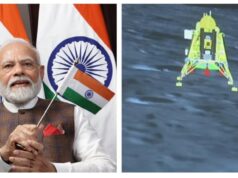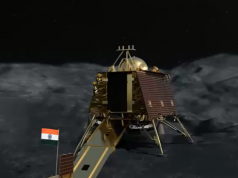New Delhi – India’s space agency launched 104 satellites, including 101 foreign payloads into orbit on Wednesday, setting a new world record and underlining the country’s ambitious space goals.
The Polar Satellite Launch Vehicle, built by the Indian Space Research Organisation (ISRO), took off at 9:28 am (0358 GMT) from the Sriharikota spaceport near Chennai on India’s south-eastern coast and placed the satellites in their prescribed orbits some 30 minutes later, officials said.
“It is a great moment for us … It is confirmed now that all 104 satellites have been successfully deployed in orbit,” mission director B Jayakumar announced at the observatory amid applause and cheering by the scientists.
Prime Minister Narendra Modi congratulated the scientists on what he called an “exceptional achievement.”
“This remarkable feat by ISRO is yet another proud moment for our space scientific community and the nation. India salutes our scientists,” Modi said.
 People watch the launch of the Indian Space Research Organization’s Polar Satellite Launch Vehicle (PSLV) in Sriharikota, Indian state of Andhra Pradesh on June 22, 2016. (Credit Image: © Stringer/Xinhua via ZUMA Wire) Photo: Stringer via Xinhua/ZUMA/dpa
People watch the launch of the Indian Space Research Organization’s Polar Satellite Launch Vehicle (PSLV) in Sriharikota, Indian state of Andhra Pradesh on June 22, 2016. (Credit Image: © Stringer/Xinhua via ZUMA Wire) Photo: Stringer via Xinhua/ZUMA/dpa
The rocket carried three satellites from India and 101 smaller nano satellites, including 96 from the United States and one each from Israel, Kazakhstan, United Arab Emirates, Switzerland and the Netherlands.
With Wednesday’s launch, the Indian space agency mission broke the existing record of 37 satellites sent into orbit from a single Russian rocket in 2014.
The primary payload on the rocket were the Indian Cartosat-2 series satellites, cartographic and earth-observation satellites, weighing 730 kilogrammes, which were the first to be injected into low-earth orbits.
Media reports say the payloads are built to monitor activities of India’s neighbouring rivals, Pakistan and China. The rest of the cargo, the smaller foreign satellites, weighed a combined 648 kilogrammes.
In recent years, India has used its trusted rocket technology to provide low-cost satellite launches, joining the relatively few players in the multi-billion-dollar space launch market.
The launches are possibly the cheapest in the world, coming at a cost about a third-less than the price charged by other space agencies and private firms.
But space analysts say India still has a long way to go before it gets a substantial share in the 203-billion-dollar commercial launch market.
Experts say the main issues are capacity – commercial launches depend on spare capacity available after meeting the needs of an Indian mission – as well as the low frequency of launches and slow turnaround of missions.
Before Wednesday, ISRO had launched 122 satellites into orbit, including 43 from India and 79 from foreign nations, using its workhorse Polar Satellite Launch Vehicle rocket since 1999. Last June, India put 20 satellites including 17 foreign payloads, into orbit in a single mission.
Scientists say Wednesday’s launch underscores increasing space capabilities and ambitious goals of India, which has sent probes to the Moon and Mars in recent years.
The Indian government recently ramped up the budget for the space programme this year and also plans to send a mission to Venus and another to Mars.
The second mission to Mars is tentatively slated for 2021-22 and the agency is also mulling plans on putting a robot on the surface of the Red Planet.
The country’s maiden mission to Venus is likely to involve sending an orbiter to the planet.
-dpa









